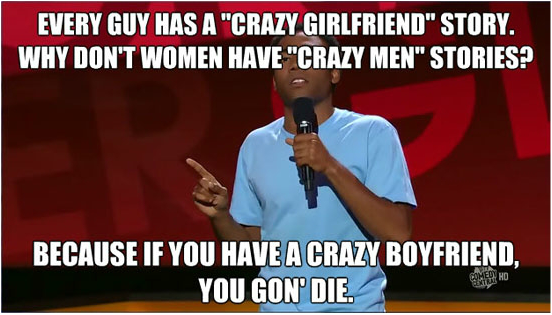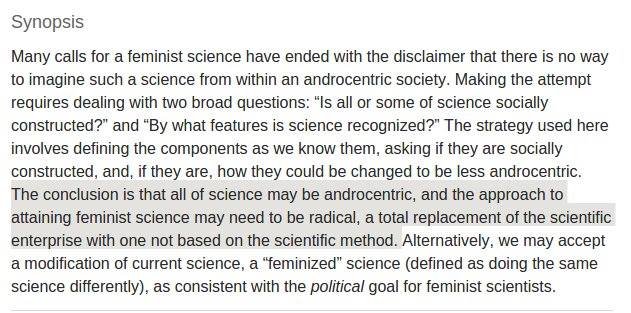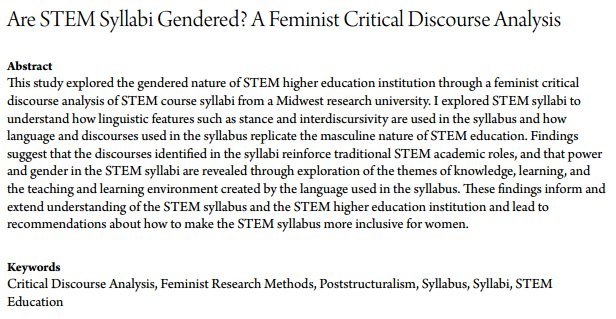|
I'm a passionate feminist -- anyone who sincerely thinks there aren't issues that disproportionately or exclusively affect women is probably not thinking clearly.
As a feminist, I know that "feminist" and "equalist" means the same thing -- feminism is about equal rights for all. Feminism is about thinking women are strong and capable. They seek to create wise policies that promote equality and remove unnecessary barriers. They seek to empower women to make decisions and changes that are right for them. Now, there's this other movement that calls itself “feminism,” that is definitely not feminism.
These "feminists," whom I've referred to as Everyday Feminism types, regressive feminists, and fauxminists, believe women are delicate butterflies. They think women are easily damaged and must, in the words of Feministing, be “consciously and actively accommodated.” (See also: Stop Expecting Women to Be Chill About Sex.)
I find regressive feminism to be incredibly infuriating, as most people who haven’t studied social sciences don’t understand the concept of “overrepresentation of extreme views.” They naively believe that "all" or "most" feminists are these extreme, regressive types. So, for those unfamiliar, overrepresentation of extreme views is a phenomenon that happens because people who are the most extreme are the most likely to respond to polls, write blog posts and op-eds, and share ridiculous Everyday Feminism articles. (See also: 4 Reasons Demanding 'Objectivity' in Social Justice Debates Can Be Oppressive -- then find one actual feminist who agrees.) Compounding that is the fact that social, broadcast and print media prefer to write/share attention-grabbing stories to bland, moderate pieces. Like, what article are you more likely to click? This:
Or this:
For these and other reasons, you're more likely to encounter views expressed by extreme members of either side of a debate, and less likely to encounter the views expressed by the moderate majority. Then, of course, there's the confirmation bias. The confirmation bias is the tendency to seek out information that confirms our beliefs -- and our tendency to generalize individual examples that confirm our beliefs to an entire population. For example, the stereotype of the "crazy girlfriend." Almost every girl I know is totally normal and rational in her relationships (though, obviously, everyone is short-tempered sometimes). But all it takes is one girl to act "crazy," and people say, "See? That's just how women are!" But what about the 9 out of 10 women who are totally normal? And what about the fact that, as far as I can tell, guys are just as crazy, if not crazier, than women in relationships? Because of this, it's easy to get confused and think that all or most feminists are “like that,” when they absolutely are not. That's why regressive feminism is a problem. Lots of people mistakenly think that those people represent feminist values. Well, let me tell you. As a woman, I -- and most women -- find regressive feminism to be incredibly insulting. It breeds this disgusting view of women as so incredibly different from men that we need to “feminize” things like science and education. Sadly, “research” on these ideas is pulling funding away from legitimate social science research -- and even threatens the very foundations of science, free speech and academia. Consider the fact that these articles have been published in “scholarly” journals (h/t Banned by Everyday Feminism): Structuring feminist science, in Women’s Studies International Forum:
Are STEM Syllabi Gendered? A Feminist Critical Discourse Analysis, in The Qualitative Report tl;dr: Words like “attain” and “must” and “will” scare women. Also, shame on professors for teaching critical thinking and the scientific method, because women don’t like the idea of knowledge being something you can “attain” — women like dynamic conversations. Glaciers, gender, and science, in Progress in Human Geology:
tl;dr: Science is scary for women, so “alternative knowledges” like folklore (that are generally marginalized through colonialism, imperialism, inequality, unequal power relations, patriarchy) ought to supplement Western science.
This is incredibly offensive. I am a big girl with a big girl brain. I don’t need to be “consciously and actively accommodated.” I don’t need the scientific method to be changed to accommodate my feminized thinking style. (It's also offensive because, once again, this "research" is pulling funding away from actual research.) And yet! Even while Everyday Feminism fauxminists claim that women are sooooo very different from men that we need to change science (and everything) for them…. they also regularly make anti-scientific claims that men and women are exactly the same. That men should be allowed to compete with women in sports. (The absolutely should not -- here’s why.) That menopause shouldn’t be viewed as something that affects women. That we should be outraged by the hashtag, #IfMenHadPeriods — because some men do have periods! Forget the very important feminist message that the hashtag originated to convey — that doctors routinely ignore women’s pain and symptoms, because they think rolling on the ground in pain three days a month is “normal,” and totally not the symptom of something serious, like endometriosis (which, undiagnosed, causes infertility), or even a parasitic twin (complete with hair, teeth and a brain). (Or that women are routinely dismissed by healthcare providers as exaggerating because they’re so emotional — which probably wouldn't happen #IfMenHadPeriods.) Many of these anti-scientific claims are harmful. For example, both EF and Feministing have written that the orgasm gap exists because of the patriarchy. They pretend that there is no biological difference between the male and female orgasm. That’s not true. The male orgasm is essential for reproduction, and therefore the survival of our entire species. Therefore, there was very strong evolutionary pressure for men to be able to orgasm easily… but not for women. The female orgasm is pretty much just for fun. Claiming otherwise is only going to make anorgasmic and preorgasmic women, as well as women who struggle to orgasm with a partner, feel like there is something wrong with them, because their biology is the same so they “should” be able to do it. But that is far from the only anti-feminist, disempowering, anti-scientific, and generally horrible advice EF writes. For example, in Everyday Feminism Just Posted The WORST Advice EVER For Women, POC and Other Marginalized Folks, I wrote about an EF article that described networking as “entitled white people crap.” This is the OPPOSITE of what you should be telling marginalized people. If you’re a woman, or black, or anything other than a white man, you need to self-promote and network like crazy! After all,
In The Everyday Feminism Guide to Inclusive Party Planning: A 10,000-Point Checklist, I wrote about the ridiculousness and impossibility of accommodating every possible disability at every time. Also — no! I’m not down with having random men “sniffing” me before I enter parties or events to make sure I’m not wearing a chemical fragrance. What about my right not to be touched and sniffed by strangers?
But no. Making sure every single person feels included is more important than my right to feel comfortable at a party. It also trumps the ability of thousands of low-income and geographically diverse people to access U.C. Berkeley's free online courses. Rather than celebrate this huge effort to increase accessibility of elite education... the regressives shut it down. If deaf people can't use it (because Cal can't afford to add captions), NO ONE CAN! In An Emerging Problem With "Intersectional" Feminism: The Scramble for Victimhood, I write about how Everyday Feminism and other regressives proudly and admittedly don’t value research, science, facts, data and certain peoples’ opinions as much as oppressed peoples’ “lived experience.” There's even this "emerging" field called "autoethnography," in which "scholars" write about their "lived experience"... in a scholarly way? And, since it's so personal to them, you're not supposed to criticize it. As per Times Higher Education's recent piece, Twitter trolls: time for academics to fight back?
Ladies. Gentlemen. This is NOT research. If you want to write about your "lived experience," start a blog! "Autoethnography" has no place in academia. Saying so isn't "academic bullying." It's criticisim of a horrible idea. Is this what "feminized" academia looks like?
In the same blog post, I gave several alarming examples of the “hierarchy of oppression,” an implicit understanding by regressives that oppressed peoples’ rights matter more than mine, because they’re more “oppressed.” For example:
How much more anti-feminist can you get?
Well... in the same post, I write about a white rape victim who apologized to her rapist for filing a police report, because he was a “refugee,” and therefore more oppressed than she. She felt so terrible about reporting him, she actually lied about his race in the original police report. Read more > Is this promoting equality? Is this creating a safer, more equal world for women? No. Everyday Feminism is doing little to promote equality. It’s an example of an extreme form of "feminism" that views women as helpless, voiceless butterflies. It simultaneously promotes the idea that men and women are so very different that men, and the workplace, and everything, must be changed to "accommodate" women... and the idea that men and women are exactly the same, despite, you know, science. And because laypeople don’t understand the idea of the confirmation bias and the overrepresentation of extreme views, such publications do a massive disservice to feminists who view women warriors.
7 Comments
CarobSteviaMate
10/11/2016 11:37:10 am
As always, you completely nail it. Hate being what feels like a "fanclub of one" as you deserve a million hits and 100s of posts.
Reply
Torkuda
11/24/2016 10:24:20 pm
This was a pretty well thought out feminist article.
Reply
Rowan
1/16/2017 03:30:38 am
Reply
Rowan
1/16/2017 06:26:35 am
The suggestion that women can't cope with science unless it's a special, feminine type of "science" is beyond patronising and offensive, whoever wrote that is the opposite of feminist!
Reply
Rowan
1/16/2017 06:34:00 am
I can't believe someone thinks getting rid of the scientific method and creating "science" to further a political goal is a good idea... that is not feminist, it's terrifying.
Reply
I disagree with the first point:
Reply
Kes Sparhawk
5/23/2018 05:25:50 pm
Finally, an opinion I agree with. I share a frustration with "Everyday Feminism" (I secretly have believed it's paid for by the FBI or NSA to disrupt the activism of young feminists, just as they had covert volunteers in my day to distract "radical" groups from organizing around questioning the state and instead steered them toward bombing government sites in order to arrest them.) But blaming the fat individual, or the allergic individual, or whatever for policies which are either implemented to make money (who makes the seats smaller and smaller every year? Not fat people. Not even thin passengers. Profiteers.) Bodily autonomy is legitimate; being aware that your perfume is probably making it impossible for other people to even attend a party is certainly something you should be told -- just as my hospital encourages patients to come fragrance free, but doesn't arrest them if they like perfumed shampoo and don't want to bother. Inconsiderate people are everywhere.
Reply
Leave a Reply. |
About the Author

Eva is a content specialist with a passion for play, travel... and a little bit of girl power. Read more >
Want to support The Happy Talent? CLICK HERE!
Or Find me on Patreon!
What's Popular on The Happy Talent:
Trending in Dating and Relationships:
What's Popular in Science: Playfulness and Leisure Skills:
Popular in Psychology and Social Skills:
Categories
All
|



































 RSS Feed
RSS Feed